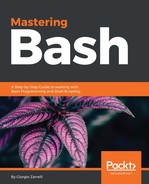As we said before, variables have no type in shell, and this makes them somehow easy to use, but we must pay attention to some sorts of limits to their use.
- First, the content of a variable is accessible only after the value has been assigned
- An example will make everything clearer:
gzarrelli:~$ cat disk-space.sh
#!/bin/bash
echo -e " "
echo "The space left is ${disk_space}"
disk_space=`df -h | grep /$ | awk '{print $4}'`
echo "The space left is ${disk_space}
We used the variable disk space to store the result of the df command and try to reference its value on the preceding and following lines. Let us run it in debug mode:
gzarrelli:~$ sh -x disk-space.sh
+ echo -e
-e
+ echo The space left is
The space left is
+ awk {print $4}
+ grep /dm-0
+ df -h
+ disk_space=3.0G
+ echo The space left is 3.0G
The space left is 3.0G
As we can see, the flow of execution is sequential: you access the value of the variable only after it is instanced, not before. And bear in mind that the first line actually printed something: a null value. Well, now let us print the variable on the command line:
gzarrelli:~$ echo ${disk_space}
gzarrelli:~$
The variable is instanced inside the script, and it is confined there, inside the shell spawned to invoke the command and nothing passed to our main shell.
We can ourselves impose some restrictions to a variable, as we will see with the next example. In this new case, we will introduce the use of a function, something that we are going to look at in more detail further in this book and the keyword local:
gzarrelli:~$ cat disk-space-function.sh
#!/bin/bash
echo -e " "
echo "The space left is ${disk_space}"
disk_space=`df -h | grep /dm-0 | awk '{print $4}'`
print () {
echo "The space left inside the function is ${disk_space}"
local available=yes
last=yes
echo "Is the available variable available inside the function? ${available}"
}
echo "Is the last variable available outside the function before it is invoked? ${last}"
echo "The space left outside is ${disk_space}"
echo "Is the available variable available outside the function? ${available}"
echo "Is the last variable available outside the function after it is invoked? ${last}"
Now let us run it:
gzarrelli:~$ cat di./pace-function.sh
The space left is
Is the last variable available outside the function before it is invoked?
The space left inside the function is 3.0G
Is the available variable available inside the function? yes
The space left outside is 3.0G
Is the available variable available outside the function?
Is the last variable available outside the function after it is invoked? yes
What can we see here?
The content of variable disk_space is not available before the variable itself is instanced. We already knew this.
The content of a variable instanced inside a function is not available when it is defined in the function, but when the function itself is invoked.
A variable marked by the keyword local and defined inside a function is available only inside the function and only when the function is invoked. Outside the block of code defined by the function itself; the local variable is not visible to the rest of the script. So, using local variables can be handy to write recursive code, even though not recommended.
So, we just saw a few ways to make a variable really limited in its scope, and we also noted that its content is not available outside the script it was instanced in. Wouldn't it be nice to have some variables with a broader scope, capable of influencing the execution of each and every script, something at environment level? It would, and from now on we are going to explore the environment variables.
